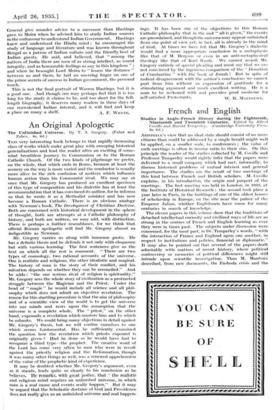An Original Apologetic
Tins very interesting book belongs to that rapidly increasing class of works which make great play with sweeping historical generalizations and lead the reader after an exciting if some- what breathless journey to Communism or to the Roman Catholic Church. Of the two kinds of pilgrimage we prefer, on the whole, that which ends in Rome, because at least the scenery on the way is more varied and the conductor is usually more alive to the rich confusion of motives which influence human action than his Communist rival. We may say at once that Mr. Gregory has produced an excellent specimen of this type of composition and his dialectic has at least the recommendation that it has convinced its author, for he informs us that he wrote it as a Methodist minister and has now become a Roman Catholic. There is an obvious analogy with Newman's book, The Development of Christian Doctrine. Both are concerned with historical development in the sphere of thought, both are attempts at a Catholic philosophy of history, and both are 'written, we may add, with distinction. There is perhaps a further resemblance, for we think that official Roman apologetic will find Mr. Gregory almost as indigestible as Newman.
Mr. Gregory carries us along with immense gusto. He has a definite thesis and he defends it not only with eloquence but with various learning. The- first sentences give us the text on which all the rest is comment. " There are two types of cosmology, two rational accounts of the universe. One is realistic and religious, the other idealistic and magical. The history of man is the story of their conflict, and his salvation depends on whether they can be reconciled." And he adds : "the one serious rival of religion is spirituality." Mr. Gregory sees the whole story of civilization as a protracted struggle between the Magician and the Priest. tinder the head of " magic " he would include all science and all phil- osophy which does not admit an objective revelation. The reason for this startling procedure is that the aim of philosophy and of a scientific view of the world is to get the universe into our minds and rests upon the assumption that the universe is a complete whole. The " priest," on the other hand, expounds a revelation which masters him and to which he submits. We could bring many objections in detail against Mr. Gregory's thesis, but we will confine ourselves to one which seems fundamental. Has he sufficiently examined the question how the revelation which priests expound is originally given ? Had he done so he would have had to recognize a third type—the prophet. The creative word of the Lord has come very often to men who were in revolt against the priestly religion and the Reformation, though it was many other things as well, was a renewed apprehension of the value of the prophetic kind of experience.
It may be doubted whether Mr. Gregory's argument, even as it stands, leads quite so clearly to his conclusion as he believes. He remarks, with great justice, that " the realistie and religious mind requires an unfinished universe, in which man is a real cause and events really happen." But it may be argued that the Scholastic doctrine of God and Providence does not really give us an unfinished universe and real happen- ings. It has been one of the objections to this Roman Catholic philosophy that in the end " all is given," the events are preordained, and though the universe may appear unfinished from one point of view yet, in fact, all is already in the mind of God. At times we have felt that Mr. Gregory's dialectic would find a more appropriate conclusion in a metaphysic like that of M. Bergson or even in an anti-metaphysical theology like that of Karl Barth. We cannot acquit Mr. Gregory entirely of special pleading and must say that we are not convinced by the ingenious comparison of the " Donation of Constantine " with the book of Jonah ! But in spite of radical disagreement with the author's conclusions we cannot part from him without an expression of gratitude for a stimulating argument and much excellent writing. He is a man to be reckoned with and provides good medicine for










































 Previous page
Previous page